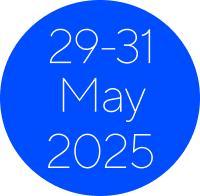Chair: Mark Merolli (Australia)
Speakers: Naoki Akiyoshi (Japan), Corelien Kloek (Netherlands), Felipe Reis (Brazil)
- Discuss the role of assessment, treatment, and remote monitoring in the context of data analytics, artificial intelligence, and supporting data-driven decision-making
- Appraise and critique technology-enabled data-driven decision-making, to navigate excessive dependency on digitally derived data and the true place of the patient at the centre of the data-driven clinical paradigm
- Discuss and contrast access, disparity, and education regarding technology-supported practice and propose next steps towards developing a shared international framework for the utility of technology, big data, and measurement technologies
Physiotherapists typically must examine and analyse several clinical variables that contribute to the patient’s unique condition [1, 2]. Further, clinical decision-making (CDM) inherently suffers from a lack of uniformity in data collection methods, as well as lack of standards about data collected, let alone its quality, or clinical relevance and instead relies on clinical experience in collecting relevant assessment information [3]. In more recent years, this paradigm has been challenged further by both the burgeoning role of, and increasing ubiquity of digital technologies which support more precise patient assessment, individualized treatment, and remote monitoring [4, 5]. Such technologies might include (but are not limited to): Internet, wearables, smartphones, and other remote monitoring devices [6]. Advances in digital health technologies provide an opportunity to augment CDM in physiotherapy by more uniformly and consistently quantifying inputs already used by physiotherapists in data collection, documentation, and synthesis [7]. This can also allow for the collection of population level data to facilitate the training of artificial intelligence models, with the intent of improving clinical decision-making and more efficient delivery of care.
However, what do we do with the prospect of ‘too much’ data? Are there downsides to all these new metrics? One danger is that digital health technologies to augment personalised analytics may mean that physiotherapists quickly get lost in a sea of confusing big data, or promote a model relying solely on data and algorithms to replace practitioners without their critical eye tying together clinical relevance. Further, action and outcomes are very much dependent on the quality of the data being collected and utilised. The Physiotherapy community must work to ensure that the advancements that digital health promises do not ultimately disadvantage those who may benefit most; including those with a lack of access and/or infrastructure.
These are challenges faced by the World Physiotherapy community; to define the role that data and technology play in the clinical pathway and ensure that they are utilised to augment the role of the physiotherapist, rather than be used in place of physiotherapists. To take into consideration clinical experience, patient values, as well as best evidence; including population level data.
Therefore, the objective(s) of this focused symposium is to support physiotherapists across the globe to navigate the digital technology age, big data, and artificial intelligence to ensure that we focus on what metrics are relevant, clinically meaningful, and important to our patients. Ultimately, what improves patient health outcomes and ensuring that data is used as another tool, rather than overwhelming the clinical decision-making process it seeks to support [8, 9].
Implications/conclusions
The implications of this symposium are many. How do we avoid getting lost in an ocean of data? Digital health is prompting us to urgently consider the right value proposition, and model for its clinical integration and utility. It is further prompting a re-think in our funding priorities, as well as competency needs of both graduate physiotherapists from university and the current workforce. This discussion is not a simple one but one we must delve into.
- Edwards, I., et al., Clinical reasoning strategies in physical therapy. Phys Ther, 2004. 84(4): p. 312-30; discussion 331-5.
- Cooper, P., Data, information, knowledge and wisdom. Anaesthesia & Intensive Care Medicine, 2017. 18(1): p. 55-56.
- van Trijffel, E., R. A.B. Oostendorp, and J.W.H. Elvers, Routinely collected data as real-world evidence for physiotherapy practice. Physiotherapy Theory and Practice, 2019. 35(9): p. 805-809.
- Merolli, M., et al., Use, and acceptability, of digital health technologies in musculoskeletal physical therapy: A survey of physical therapists and patients. Musculoskeletal Care, 2022. n/a(n/a).
- Tack, C., Artificial intelligence and machine learning | applications in musculoskeletal physiotherapy. Musculoskeletal Science and Practice, 2019. 39: p. 164-169.
- Murray, E., et al., Evaluating Digital Health Interventions: Key Questions and Approaches. Am J Prev Med, 2016. 51(5): p.843-851.
- Patel, V.L., D.R. Kaufman, and T.G. Kannampallil, Diagnostic Reasoning and Decision Making in the Context of Health Information Technology. Reviews of Human Factors and Ergonomics, 2013. 8(1): p. 149-190
- Mendes, J.J.A., Jr., et al., Sensor Fusion and Smart Sensor in Sports and Biomedical Applications. Sensors (Basel, Switzerland), 2016. 16(10): p. 1569.
- Appelboom, G., et al., Smart wearable body sensors for patient self-assessment and monitoring. Arch Public Health, 2014. 72(1): p. 28.
See the 24 focused symposia to be presented at congress.
Find out who the key speakers at congress will be.
Find out which clinical topics will be covered in these discussion-based seminars.




